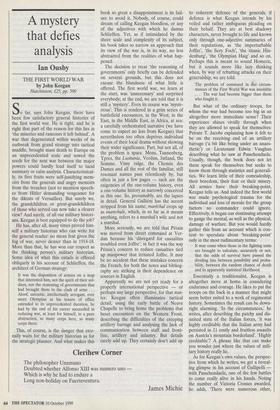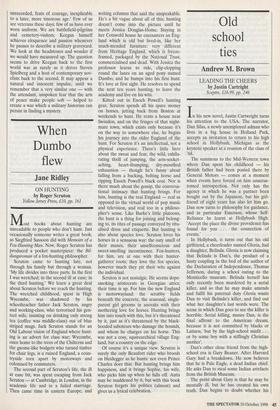A mystery that defies analysis
Ian Ousby
THE FIRST WORLD WAR by John Keegan Hutchinson, £25, pp. 500 So far, says John Keegan, there have been few satisfactory general histories of the first world war. He is right, and he is right that part of the reason for this lies in 'the miseries and rancours it left behind'. A war that degenerated within weeks of its outbreak from grand strategy into tactical muddle, brought mass death to Europe on an unprecedented scale and sowed the seeds for the next war between the major powers could hardly lend itself to lucid summary or calm analysis. Characteristical- ly, its first fruits were self-justifying mem- oirs from the generals and angry memoirs from the trenches (not to mention speech- es from Hitler demanding vengeance for the diktats of Versailles). But surely we, the grandchildren or great-grandchildren of those who served can now take a clearer view? And surely, of all our military histori- ans, Keegan is best equipped to do the job?
He has, after all, many times proved him- self a military historian who can write for the general reader: no mean feat given the fog of war, never denser than in 1914-18. More than that, he has won our respect as the thinking person's military historian. Some idea of what this entails is offered obliquely in his account of Schlieffen, the architect of German strategy:
It was the disposition of armies on a map that interested him, not the spirit of their sol- diers, nor the reasoning of governments that had brought them to the clash of arms .. . Aloof, sarcastic, intellectually arrogant, ever more Olympian as his tenure of office extended to its unprecedented duration, he had by the end of his career succeeded in reducing war, at least for himself, to a pure abstraction, so many corps here, so many corps there.
This, of course, is the danger that eter- nally waits for the military historian as for the strategic planner. And what makes this book so great a disappointment is its fail- ure to avoid it. Nobody, of course, could dream of calling Keegan bloodless, or any of the adjectives with which he damns Schlieffen. Yet, as if intimidated by the sheer scale and complexity of its subject, his book takes so narrow an approach that its view of the war is, in its way, no less abstracted from the realities of what hap- pened.
The decision to treat 'the reasoning of governments' only briefly can be defended on several grounds, but this does not excuse the blandness of what little is offered. The first world war, we learn at the start, was 'unnecessary' and surprised everybody; at the end, we are told that it is still a 'mystery'. Even its course was 'myste- rious'. This is rendered in a grim series of battlefield encounters, in the West, in the East, in the Middle East, in Africa, at sea: a carefully orchestrated narrative (we have come to expect no less from Keegan) that nevertheless too often deprives individual events of their local drama without showing their wider significance. Part, but not all, of the problem is space. Mons, Tannenberg, Ypres, the Lusitania, Verdun, Jutland, the Somme, Vimy ridge, the Chemin des Dames and all the rest of the familiar, still resonant names pass relentlessly by, but often in just a few pages — such are the exigencies of the one-volume history, even a one-volume history as narrowly conceived as this one. So, presumably, are the lapses in detail. General Gallieni has the accent stripped from his name; marechal crops up as marechale, which, in so far as it means anything, refers to a marshal's wife and not a marshal.
More seriously, we are told that Main was moved from direct command at Ver- dun because his 'disregard for casualites troubled even Joffre'; in fact it was the way Petain's concern to reduce casualties tied up manpower that irritated Joffre. It may be no accident that these mistakes concern the French, for both the notes and bibliog- raphy are striking in their dependence on sources in English.
Apparently we are not yet ready for a properly international perspective — or perhaps any large perspective, for that mat- ter. Keegan often illuminates tactical detail, using the early battle of Neuve Chapelle to bring home the problems that beset encounters on the Western Front, describing the difficulties of the creeping artillery barrage and analysing the lack of communication between staff and front- line, artillery and infantry. But details rarely add up. They certainly don't add up to coherent defence of the generals, if defence is what Keegan intends by his veiled and rather ambiguous pleading on their behalf. They are at best shadowy characters, never brought to life and known only through one-adjective summaries of their reputations, as 'the imperturbable Joffre', 'the fiery Foch', 'the titanic Hin- denburg', 'the Olympian Haig' and so on. Perhaps this is meant to sound Homeric, but it sounds more like lazy thinking when, by way of rebutting attacks on their generalship, we are told:
The problem of command in the circum- stances of the First World War was insoluble . . The war had become bigger than those who fought it.
But what of the ordinary troops, for whom the war had become too big in an altogether more immediate sense? Their experience shines vividly through when they are allowed to speak for themselves: Private T. Jacobs explaining how it felt to be on the receiving end of an artillery barrage ea bit like being under an anaes- thetic') or Lieutenant Edwin Vaughan describing what he saw at Passchendaele. Usually, though, the book does not let them speak for themselves but seeks to know them through statistics and generali- ties. We learn little of their comradeship, their boredom, their fear or their misery. All armies have their breaking-point, Keegan tells us. And indeed the first world war made psychological trauma for the individual and loss of morale for the group factors no commander could ignore. Effectively, it began our continuing attempt to gauge the mental, as well as the physical, damage of warfare. But you would hardly gather this from an account which is con- tent to speculate about 'breaking-point' only in the most rudimentary terms:
It may come when those in the fighting units are brought to calculate, accurately or not, that the odds of survival have passed the dividing line between possibility and proba- bility, between the random chance of death and its apparently statistical likelihood.
Essentially a traditionalist, Keegan is altogether more at home. in considering endurance and courage. He likes to pat the troops on the back in a manner that might seem better suited to a work of regimental history. Sometimes the result can be down- right alarming. 'In the circumstances,' he writes, after describing the patchy and dis- united state of the Italian forces, 'it was highly creditable that the Italian army had persisted in 11 costly and fruitless assaults on Austria's mountain borderland'. 'Highly creditable'? A phrase like that can make you wonder just where the values of mili- tary history really lie.
As for Keegan's own values, the perspec- tive from which he writes, we get a teveal- ing glimpse in his account of Gallipolli — with Passchendaele, one of the few battles to come really alive in his hands. Noting the number of Victoria Crosses awarded, he adds, 'There were numerous other, unrecorded, feats of courage, inexplicable to a later, more timorous age.' Few of us are veterans these days; few of us have ever worn uniform. We are battlefield-pilgrims and cemetery-visitors; Keegan himself achieves eloquence and passion whenever he pauses to describe a military graveyard. We look at the headstones and wonder if we would have measured up. The question seems to drive Keegan back to the first world war as surely as it drives Steven Spielberg and a host of contemporary nov- elists back to the second. It may appear a natural and innocent impulse, until we remember that a very similar one — with the attendant, unspoken fear that the arts of peace make people soft — helped to create a war which a military historian can persist in finding a mystery.











































































 Previous page
Previous page